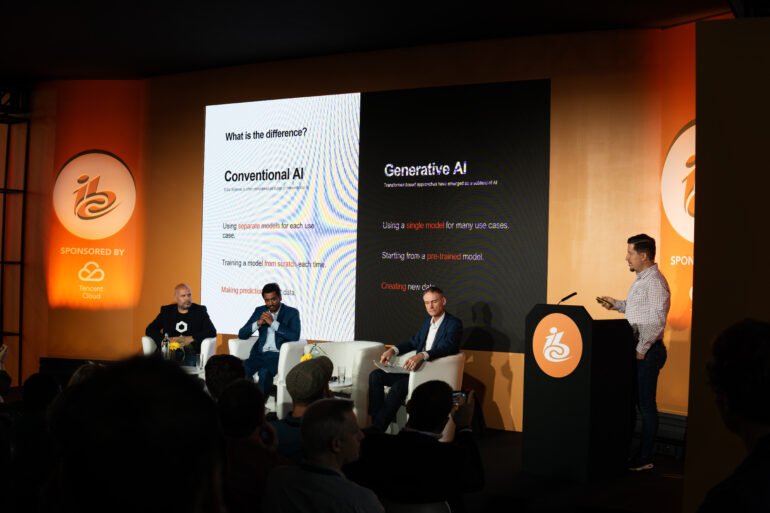
AI Is Changing the Media Industry – Specialists Addressing Bias, Ethics, and Other Complexities and Advantages of AI
From increased creativity and saving society to bias and risks. AI is here to stay and to change the entire society. Or is it? Hear what the industry-leading AI experts have to say!
During IBC2023, it was distinctly emphasized that AI plays a defining role in shaping the future of the media industry.
The opportunities of AI are undeniable. From creating top-quality content to making our society better, constantly evolving AI can be curated to handle almost every kind of task. Therefore some are calling AI as Assistal Intelligence.
In 2023 alone, more than 7,000 new artificial intelligence applications have been created. And there’s no signs of slowing down. But is it that simple?
In this article we go through how AI specialists see the main questions about AI, what they think we should be aware of as AI continues its rapid growth, and how broadcasters and the media industry could benefit from AI.
AI Extend Beyond Industry Boundaries
All innovation is interconnected. That’s why we need to see AI not only as a part of the evolution of the media industry but also throughout society and humanity.
Dex Hunter-Torricke, Head of Global Communications & Marketing of Google Deepmind, stated in his keynote speech that AI has the potential to drastically transform our world for the better – from fighting plastic pollution to discovering new medical drugs to prevent and treat disease.
It is important to understand the extent of innovations in the lives of current and future generations. AI develops so quickly that things that still seem so small can grow incredibly big in the future.
– It is very clear that responsibility, innovation, and AI must go hand in hand, Hunter-Torricke stated.
– Artificial Intelligence can be misused in many ways. Abuse cannot be avoided, and therefore one must be able to respond to it properly. AI can be harnessed to recognize things created with artificial intelligence, he added.
Hunter-Torricke ended his speech by saying that AI opens up incredible possibilities, but it will never solve everything. We should never fully rely on it, but see the unlimited potential it has – in good and bad.

Dex Hunter-Torricke talked about AI as a part of the whole global society.
Addressing Bias and the Complex Path to Neutrality
When discussing humanity and reshaping society, it’s crucial to consider the ethical obligations and responsibilities associated with AI.
One of the fundamental ethical concerns surrounding AI is the potential for bias. AI systems often learn from historical data, which can carry biases present in that data. This can lead to AI systems making unfair or discriminatory decisions.
Bias of AI was discussed in a panel discussion led by Renard T. Jenkins, President of SMPTE. The power panel of three women presented their experiences of the possibilities and limitations of artificial intelligence and discussed solutions for possible shortcomings.
– Ethics and AI must be in line. If they’re not, bias creates mistrust and mistrust reduces usage, started Kylee Peña, Product Marketing Manager of Adobe.
As an example of the bias of artificial intelligence, she brought up the generic female and male stereotypes.
– It is important to remove your own natural bias. Male and female stereotypes, for example.
– On one AI platform we made AI to generate an ugly woman. Despite many attempts the woman was still hot.

AI’s version of the earlier Hunter-Torrick’s image.
Jenkins added to this how ChatGPT was really racist when it came out, even if it wasn’t consciously built that way.
In the discussion, it came up that responsibility and ethics are not always seen as a necessity in the development of AI, but only as a slow-down. To fix this, one important aspect is to involve as diverse a crowd as possible in the development. However building a totally neutral AI is almost impossible.
– According to whose reality will the AI be built? The UK has such a different reality than Saudi Arabia, so it is not easy to create a common entity, asked Alexandra Hussenot, Board advisor of Women in Immersive Tech.
Prioritizing End-Users’ KPIs
Jenkins asked one heavy question during the panel: what are we actually building AI to do?
Indeed, that’s probably the most important question ever about AI. To point this up, the panelists mentioned that AI development should focus on end users KPIs, not companies’ KPI’s.
Prioritizing end-users’ KPIs means designing AI systems and applications with a deep understanding of how they will impact individuals and society as a whole. This approach acknowledges that AI technologies are tools meant to serve and augment human capabilities, rather than replace or manipulate them.
– Feedback is extremely important in the development of AI. We call it a feedback loop, Peña said.
Just like Hunter-Torricke, Jenkins, Peña, Hussenot, and Mala Ramakrishnan (Chief Product Officer, CuVo) all agreed that it is very easy to use AI wrong and it’s extremely important to develop AI ethically right.
– I’m afraid of what AI can become at its worst. AI gives a lot of power, which can be badly misused, Hussenot said.
– It’s still like a toddler. It’s not mature yet, Jenkins described AI.
Opportunities, Limitations, and Ethical Considerations of AI on The Broadcasting Ecosystem
One of the main topics discussed in the vast halls of RAI Amsterdam was AI and its potential impact on the broadcasting ecosystem and the whole media industry.
It was no wonder that the ‘Opportunities and Limitations of AI’ panel at Content Everywhere delved extensively into AI’s role within the broadcasting industry. Through various use cases, three specialists elucidated the conundrums that AI will introduce.
Radu Orghidan, Principal Data Scientist of Endava, outlined that there’s two types of AI: conventional and generative. Where conventional AI uses separate models for each use case, uses generative AI a single model for many use cases. Either way, AI can benefit every stage of the broadcast ecosystem, from content creation to engagement.

‘Opportunities and Limitations of AI’ panel.
This panel also discussed the ethics of AI. Colin Dixon, Founder and Chief Analyst of nScreenMedia brought up the term content bubble as something to be cautious about.
Luckily, as AI can be biased, we users can avoid content bubbles by employing our critical thinking and not accepting everything AI feeds us.
– From a tech point of view, the creators have to observe biases and the models should be transparent enough to enable understanding that there might be some going into some narrow corners from which the bubble grows, Orghidan explained.
Phani Kolaraja, CEO of CuVo, stressed the significance of ethical AI usage, highlighting the need for developments to be rooted in principles of privacy and trust. He urged users to place trust in AI systems while also ensuring the preservation of their privacy.
More Time for Creativity
Let’s move from a big picture to a smaller and more practical one. What are the main areas where broadcasters can benefit from AI?
AI allows hyper-personalization of content as AI is so capable to analyze data and build algorithms out of it. This leads to improved customer experience, increased revenue, reduced churn, and data-driven insights.
Despite the obvious benefits of having high-quality metadata, the task of adding it to countless files and records might seem like an incredibly time-consuming and tedious process. Thankfully, AI has emerged as a powerful ally in simplifying and automating metadata management.
Third huge benefit is all that time that AI saves from companies and specialists. That “new” time can (and should!) be used for creativity. Whether it is finding new ways to develop business or creating a better society, AI helps us by lessening our workload.
– Freeing up a lot more time for developers to be creative. I think that in itself is a big positive in terms of industry as a whole and in terms of the pace of development over time, said Stuart Huke, Head of Product of 24i.
As we heard at IBC, AI is here to stay in the media industry. It depends on us people, where to and how we want to develop it. The question “what do we want AI to do and why” is maybe the most important one and must not be forgotten.
– We’ve only just begun in seeing how AI is impacting us, said Dixon and ended the discussion.

About IBC
IBC is the world’s most inspiring content and technology event. It draws together the global media, entertainment and technology industry for a compelling live experience that enables every attendee to gain critical insights, share expertise and unlock business opportunities. Created ‘by the industry, for the industry’ – a principle established on its founding in 1967 that carries through to today – IBC has continued to evolve with each new trend and technology over its 56-year history. Attracting representatives from 24 countries in its first year, IBC now welcomes exhibitors, speakers and visitors from more than 170 nations.